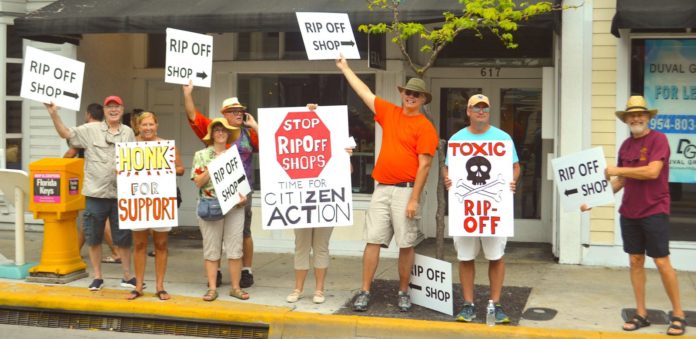The city’s ongoing attempts to crack down on the practices of Duval Street cosmetic shops have been nearly overshadowed this week. The local media and resident response to charges of anti-Semitism leveled by Commissioner Sam Kaufman at the city commission meeting Jan. 2 have all but blotted out the particulars of the actual ordinance. The Jan. 2 meeting hosted a number of citizens in vocal support of a proposed ordinance to crack down on cosmetic shops. The ordinance would supplement an existing state law prohibiting non-state-licensed cosmetologists from applying products, in the manner that Duval Street cosmetic shops have been reported to do. The ordinance would create a criminal penalty, including up to 60 days in jail and a $500 fine, for businesses violating this. This marks another effort on the city’s part to dissuade unscrupulous business practices on Duval Street.
A number of the cosmetic shops have come under fire from local activists for aggressive sales tactics — from luring in buyers with the promise of free samples to charging credit cards more than agreed upon. As previously reported by the Weekly, the consumer advocate group, the Rip-Off Rapid Response Team, led by community activists Bruce Mitchell and Tevis Wernicoff, has taken to picketing outside the stores. Their current focus for picketing is ERA Ageless at 617 Duval St. On Jan. 8, Wernicoff and the owner of ERA Ageless at 617 Duval St. had a meeting about the terms of a “responsible business practices agreement,” a good-faith agreement referencing obeying city laws as well as clear standards for their return policy. If the owners do sign the agreement, Mitchell and Wernicoff agree to stop picketing in front of their store. As of presstime, the owners were reviewing the agreement with lawyers.
Several Rip-Off Rapid Response team members, including Mitchell and Wernicoff, testified at the Jan. 2 meeting, which resulted in a 5-1 vote passing the ordinance. Mary Lou Hoover was absent. The lone vote against the ordinance? Commissioner Sam Kaufman.
The Key West Citizen reported Kaufman’s dissent, citing his Jewish identity as a pertinent factor in the vote and describing it as “unclear why Kaufman broached the topic of religion” in the discussion of the cosmetic shops controversy. Kaufman was quick to act: in an email shared with The Weekly, he said the Citizen had not contacted him to clarify his dissent, nor had The Citizen cited Kaufman’s questions voiced at the meeting, reflecting a concern about the legality — not the bias — of the ordinance. More on that later.
Kaufman’s reasons for alleging anti-Semitism? Threefold. In the email to Citizen Editor Kay Harris and Publisher Richard Tamborrino, Kaufman cites “the signs of protestors referencing Jews.” He’s speaking of a sign held by protester Shirlee Ezmirly. While the Weekly was unable as of presstime to obtain the text of the sign, Wernicoff said the sign read, “I’m Jewish, and I’m protesting.” Others report the sign specified the shop was owned by “Jews.” Wernicoff said: “I didn’t think it was the right tone, and I asked her to put it away.” By all reports, Ezmirly did not put the sign away. Collaborator Bruce Mitchell denied any such language on protest signs. Kaufman noted: “At the city commission meeting, we had a woman say that the workers at a store were wearing stars of David, and she had a sign essentially saying Jews were operating the store. If you had a sign that said blacks, gays, or Cubans own the store, it would be a problem. Why depict the religion of the owners of the store?”
Kaufman also said in his email to The Citizen that he asked Wernicoff, who is Jewish, to “meet with other Israelis in our community, some who have lived, worked, owned stores on Duval Street for many years and who are not involved with the cosmetic shop.” Kaufman says Wernicoff responded with a “categorical ‘no.’” Kaufman went on to remark to the Weekly that Wernicoff had said that “they are in it together,” implying that Israeli and Jewish members of the business community were colluding in favor of the shops. Wernicoff said, “I don’t recall saying we can’t have a meeting,” though he and Kaufman agreed that they had a purposeful conversation regarding a future meeting. In this conversation, Kaufman describes leveling with Wernicoff about his internalized anti-Semitism, a claim inspired in Kaufman by Wernicoff’s described categorical comments about the Israeli and Jewish community in Key West. Wernicoff describes a similarly charged and ultimately positive conversation, after which he said, “I’ve had a great deal of soul searching, and I have asked myself if I’m acting in an anti-Semitic way.”
Both Kaufman and Wernicoff report willingness for a future conversation, proposed by Kaufman at a local pizza shop, for the men to sit down with other leaders of the Israeli and Jewish community, to discuss how to curb unethical business practices as well as anti-Semitic rhetoric in the community.
The final concern Kaufman cited in his email to The Citizen was a video circulated of Rip-Off Rapid Response Team leader Bruce Mitchell physically attacking a Jewish teenager — a tourist who had visited a cosmetic shop with his mother and sister (also in the video). Mitchell said: “What happened before was… I was facing the street, and this young man pushed me into the street and called me a racist and grabbed the sign and started running up the street, and I caught up to him and I grabbed the sign. All I was trying to do was get my signs back.” Mitchell called the attention the incident has garnered “a red herring.” While there certainly may be events leading up to the video taped material, in the video, Mitchell visibly physically attacks and kicks the young man. Kaufman wrote “there is no place for violence on Duval Street.” Wernicoff concedes that the incident was “inexcusable,” and said “that won’t happen again, I hope.”
As of press time, the Citizen continues to print criticisms of Kaufman in the “Citizen’s Voice” and “Cheers and Jeers” sections. On Jan. 7, a “Citizen’s Voice” writer questions “Why is there this sudden, heretofore unmentioned concern regarding religion?” in reference to Kaufman’s concerns. Kaufman reports the Citizen has still not contacted him for an interview regarding his reasons for voting against the new ordinance.
And what are Kaufman’s reasons for his vote? Kaufman said: “The main reason I voted against the ordinance was not anti-Semitism or nationality. I want to make sure it will withstand legal challenge. We know there is a high likelihood this ordinance will be challenged in court, and we need to be sure that the state preemption issue is legally upheld, and we won’t put the city at risk with a claim that the city is overstepping its bounds in terms of how the city is regulating cosmetology.” At the Jan. 2 commission meeting, Kaufman asked a series of questions about precedents for state preemption in Florida. While City Attorney Sean Smith was not aware of such precedents, Commissioner Clayton Lopez said that Lakeland and Orlando have made similar ordinances. Kaufman asked: “Have Lakeland or Orlando had legal pushback? State preemption is a significant legal issue, and there may be others. That should be our main concern, as when taxpayer dollars are at stake, it’s our responsibility. We must make certain we’re prudent and that we are making laws that aren’t exposing our taxpayers to potential damage in lawsuits.”
Kaufman cites the Ducks Tour case, in which the city denied a license to operate, citing the monopoly of Historic Tours of America, which runs the Conch Train. The city of Key West was sued by Ducks Tour Seafari, and the city settled for a pay-out of $8 million in 2009.
Kaufman claims that this due diligence on behalf of taxpayers is the real reason behind his vote, though he stands by his claim of anti-Semitic rhetoric in the Key West community. To be fair, these moments in Key West history are well-documented (See sidebar). In more recent years, rhetoric surrounding Israeli-owned T-shirt and cosmetic shops has veered into such a categorization. Said Kaufman: “If you hear the term ‘Israeli T-shirt shop,’ it’s used in a derogatory way. Well why is it ‘Israeli cosmetic shop?’ Why would it be ‘gay store’ or ‘African American or black store,’ or so forth?”
Kaufman said: “There is some strong emotional language involved, and we should be even-tempered and strategic and careful in how we make new laws, especially ones that we know will have a legal response.”
Wernicoff said: “I can understand how Commissioner Kaufman feels (about anti-Semitism), but that’s not the issue … I’m not anti-Semitic, but I am anti-crook.”
The Weekly reached out to Mayor Teri Johnston, who voted “yes” on the ordinance. She wrote: “This is a very straight-forward issue of unscrupulous business activity occurring in the heart of our commercial and tourism corridor. The negative impact to the surrounding business owners, residents of Key West and our visitors warrants action by the City Commission.”
Kaufman expressed hope that the city attorney’s office is able to answer his legal questions about precedent by the City Commission meeting on Jan. 15, and he expressed continuing hopes that he, Wernicoff, and other members and leaders of Key West’s Jewish community might meet and discuss how to promote peaceful protest and language that reinforces the city’s motto of “One Human Family.” Said Wernicoff: “I sent him a little note the other day and said ‘I’ve thought about our conversation, and I’m ready to have some pizza.’”
In the book “The Jews of Key West: Smugglers, Cigar Makers and Revolutionaries” by Key West Literary Seminar Director Arlo Haskell, the author cites pillars of the community like Dr. Joseph Porter, whose anti-Semitism has been documented as potentially interfering with his efforts to investigate yellow fever. In short, Porter’s journals reveal a focus on tracing the disease to Jewish neighborhoods, ultimately negatively impacting his identification of the connection between the spread of the disease and mosquitos. Haskell also notes that Porter shared racial theories about how these diseases were spread with other health officers. Said Haskell: “There is a long history throughout the world of Jewish business owners being put out of business by non-Jewish majorities. I am not claiming that is the case here, because I don’t know the protestors or their motivations. But Sam might be viewing this through a historical lens. That’s a context that shouldn’t be ignored.”

























